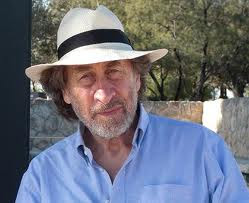
This is probably the most insular book I have ever read in my life.
This was a proud title previously held by Antonia Fraser’s MUST YOU GO. While respecting that lady’s grief, I find her unbearably irritating: the endless annoying name dropping, made more annoying still by the cosy assumption that we all knew to whom the names referred. References to stupid restaurants made more irksome by an assumption that we all knew these stupid restaurants. In short, a book as if the whole world is London, and north west London at that. THE FINKLER QUESTION is absolutely a book in this maddening mould.
Essentially, it tells the story of one Julian Treslove, whose two best friends, Finkler and Libor have both recently been widowed, and who are both Jewish. After a dinner with these two, Treslove is mugged, and believes that the mugger says to him: “You Jules” or “You Ju” or “Your Jew”. Cue a lot of stupid contemporary literature word games, at the end of which Julian decides he must be Jewish, or wants to be Jewish. He starts living with a Jewish woman, and is absorbed into Jewish culture. The characters increasingly feel that anti-semitism is growing, and eventually Libor kills himself, Finkler decides he must defend Israel at last, and Julian has a breakdown. I get irritated just writing down the plot outline.
I’m going to go ahead and tell you that I thought this book was borderline racist. It’s been a long time since I read a book so obsessed with ethnicity, and I don’t approve of it AT ALL. Maybe it’s a Zimbabwean thing. I grew up fighting the good fight in post-Independence Zim very much against that very idea: that you are your ethnicity; that your relationships are or should be bound by your ethnicity; and that your ethnicity has deep importance. I guess I’m still the adolescent I was, because I still don’t approve of all this ethnic talk ONE BIT. As if being born Jewish or Gentile or black or white is some fundamental thing we all have to bow down to and be defined by on every level. Total crap.
Also, total self-absorption. He repeatedly says things like “You can divide the world into two halves: those that hate Jews and those that want to be Jewish.” REALLY? I think I’m pretty clear that there might just be a few people in Rwanda, say, who are too busy hating each other for their colour to hate them for their religion. And that’s true in many, many other countries. I seriously hadn’t even heard of the supposed ‘Jewish stereotypes’ he (repeatedly) refers to.
It was like talking a bath in someone’s navel. Revolting. This is particularly so because the book seems bizarrely unaware of the fact that some other ethnicities in London might also have a few teensy weensy little issues: like, what’s least safe walking down the street a) Arab b) Black c) Jewish. Yes, it’s not c). There’s much apparent debate about the Palestinian issue, which is in fact no debate at all.
Lastly, there are lots of unbelievable weak jokes. Eg: The Finkler Question, instead of The Jewish Question. Oh, the comedy. Oh, my sides ache. Perhaps weak jokes from a clever writer are supposed to charmingly irreverant, or post-modern. Or how about just weak.
Seriously, I can’t believe this piece of crap won the Booker. I almost gave up on this thing on page 102, and I am still bitter that I didn’t. That’s a few hours of my life I’ll be regretting on my death bed.
